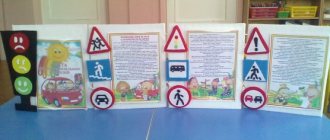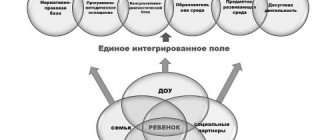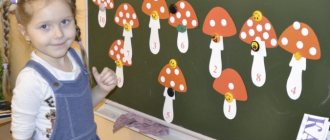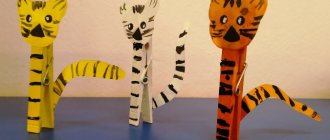Methodological work with kindergarten teachers
Bibliographic description:
Rybina, N.P. Methodological work with kindergarten teachers / N.P. Rybina.
— Text: immediate // Current issues of modern pedagogy: materials of the II International. scientific conf. (Ufa, July 2012). - Ufa: Summer, 2012. - URL: https://moluch.ru/conf/ped/archive/60/2513/ (access date: 12/19/2021). Nowadays, the importance of such business qualities as competence, a sense of the new, initiative, courage and willingness to take responsibility is increasingly increasing; the ability to pose a problem and complete its solution. A skilled methodologist clearly defines the tasks of the teaching staff and clearly outlines ways to solve them.
The effectiveness of the work of the entire team of a preschool institution depends on the correct choice and use by the methodologist of various forms of methodological work in the preschool institution. All areas of methodological work contribute to the development of a unified line of action for the teaching staff.
The main directions of the methodologist’s work are organizing the methodological work of the team, improving the qualifications of educators, studying, generalizing and disseminating advanced pedagogical experience, and improving the level of work of teachers. In accordance with these directions, the main forms of work of the methodologist are determined.
One of the significant features of the education system of the last decade is the variability of the work of preschool institutions. Polyprogramming and variability are the conditions in which preschool institutions currently operate.
An indisputable advantage is that the variability of modern preschool education allows it to respond to the needs of society. The variety of pedagogical services offered by the preschool institution meets the increased demands of parents. The main thing is that the priorities of education are preserved: promoting health, providing favorable conditions for the development of children, respecting the child’s right to preserve his individuality [1, p.8].
The humanization of modern education is associated, first of all, with a change in attitude towards education, the center of which is the child. The issue of choosing a program has been and remains very relevant. In this regard, the kindergarten methodologist faces a rather responsible task - to choose a program of work with children that can not only be successfully implemented by the teaching staff, but will also contribute to the effective development and upbringing of children. Therefore, teaching staff of preschool educational institutions should be oriented in the main trends of the program and methodological flow.
The work of preschool educational institutions in conditions of polyprogramming and variability of technologies ensures self-determination and self-organization of participants in the educational process: preschool educational institutions model programs, projects, participate in experimental testing and implementation of new program and methodological materials, and parents are given the opportunity to choose one or another type of preschool educational institution for their child. The process of creating general developmental and specialized educational programs and innovative pedagogical technologies continues. The introduction of various approaches to the organization of the pedagogical process is very promising for the preschool education system as a whole. In this regard, the question arises about the role and significance of methodological work for the effectiveness of the educational process.
Increasing the skills of teachers, improving their theoretical and practical knowledge is carried out in a preschool institution through various forms of methodological work. All areas of methodological work contribute to the development of a unified line of action for the teaching staff.
The manager’s work is made easier if the child care institution has a methodologist on staff. The head is obliged to lead and direct the educational work in the children's institution, the methodologist is his first assistant [3, p. 12].
In order for methodological work to be effective, the methodologist needs to know how things are in the preschool institution: what conditions are created for raising children, what is the level of pedagogical work in the kindergarten, what are the relationships in the team, etc.
The real center for organizing methodological work in a preschool institution is the methodological office. The room intended for this purpose is equipped with the necessary materials and manuals for all sections of educational work with children [1, p. 110].
The methodologist performs the following professional functions:
— Maintains personal records of teaching staff who improve their qualifications in courses and seminars, in advanced training institutes, in faculties for training and advanced training of educational organizers and students in correspondence and evening departments of higher and secondary specialized educational institutions.
— Coordinates and directs methodological work with teaching staff; organizes seminars, workshops, lectures, consultations on the most complex and pressing issues of training and education. Uses a variety of active forms in the practice of working with teaching staff: interviews, debates, conferences, business games, analysis of pedagogical situations.
— Conducts group and individual consultations; provides assistance in self-education of teaching skills.
In the teaching room, it is necessary to have materials on best pedagogical experience, diary entries of the methodologist, reports for kindergarten teachers, calendar plans for educational work with children, materials that clearly illustrate best practices: photographs, sketches, tape and electronic recordings, children's work, manuals , made by the teacher [2, p.252].
It is very important that all materials available in the teaching room are correctly selected and placed. Their placement can be carried out in different order: either by type of children’s activities (organizing the life and upbringing of children, learning in the classroom, holidays and entertainment, games, work), or by educational areas (“Health”, “Safety”, “Physical Education” , “Socialization”, “Work”, “Cognition”, “Communication”, “Reading fiction”, “Artistic creativity”, “Music”).
If the placement is by type of activity, then within each section there should be material allocated for each age group; if for educational purposes, then the materials are allocated both by type of activity and by age group. When systematizing materials, one should take into account the principle of construction of the “Program of education and training in kindergarten”.
For example, materials on gaming activities are arranged by type of game; for labor education - by types and forms of labor organization, etc. All sections should contain instructional and methodological documents, methodological recommendations, material from work experience, visual and illustrative materials.
Instructional and regulatory documents on preschool education are located in a separate folder. Materials on organizational and other issues (for example, on managing a kindergarten, equipping an institution, working with personnel, etc.) are also presented in a specific place.
Care should be taken to ensure that the classroom has sufficient materials on the education of young children, for teachers of speech therapy groups, and music directors.
One of the key issues in improving the system of public preschool education is improving the management of educational, administrative and economic activities of children's institutions. Therefore, in the methodological room it is necessary to equip a special section “Management of preschool institutions”, in which legislative and instructional documents, methodological recommendations, and materials from work experience would be concentrated.
The methodologist also organizes various forms of methodological assistance to educators, for example: consultations, thematic conversations with educators. Some problems of raising children require a longer conversation and discussion, and if they concern several educators, then it is advisable to organize a collective form of methodological assistance, which is a seminar.
Significant efforts are required from the methodologist to study, generalize and implement best practices, which is a set of knowledge, abilities, skills acquired by the educator in the process of practical educational work.
One of the leading forms is the pedagogical council
, which is called upon to be an exponent of collective pedagogical thought, a body of collegial management of educational work, a school of excellence and a tribune of pedagogical experience. The head, being the chairman of the pedagogical council, organizes its work on the basis of the “Regulations on the pedagogical council of a preschool institution” [3, p.62].
During the year, at least 4 meetings of the teachers' council are held, at which topical issues of the work of this kindergarten are discussed, aimed at increasing the professional level of teachers' work, at eradicating shortcomings in the educational process.
Meetings of the teachers' council can be devoted to general issues of improving children's health, reducing morbidity, and preparing children for school.
The preparation of the teachers' council includes the selection of topical issues, the discussion of which is dictated by the educational program in the kindergarten and the actual state of affairs in the kindergarten, which are included in the annual work plan.
Already at the beginning of the school year, the entire teaching staff knows what issues will be discussed, who speaks at the teachers’ council and when, each speaker must prepare in advance for the teachers’ council: develop a specific plan of events on their topic.
The effectiveness of pedagogical councils depends mainly on the work of the methodologist aimed at implementing the decisions made.
Consultations
– a permanent form of assistance to educators. In a children's institution, consultations are held for teachers of one group, parallel groups, individual and general (for all teachers). Group consultations are planned throughout the year. Individual consultations are not planned, since their conduct is dictated by the need of educators to obtain certain information on a specific issue.
However, not all questions can be answered comprehensively in a short period of time. Some problems of raising children require a longer conversation and discussion, and if they concern several educators, then it is advisable to organize such a collective form of methodological assistance, which is a seminar
.
Experienced educators who have good results in working on a particular problem can also be appointed to lead the seminar. At the beginning of the school year, the methodologist determines the topic of the seminar and appoints a leader. The duration of classes depends on the topic: they can take place over a month, six months or a year. Attendance at the seminar is voluntary.
Preschool workers can reinforce the theoretical knowledge acquired at the seminar with practical skills, which they consolidate and improve by participating in the seminar-workshop.
. How to make a hare so that it looks like a real one, how to show a puppet theater so that the characters bring joy to children and make them think, how to teach children to read a poem expressively, how to make didactic games with your own hands, how to decorate a group room for the holiday. Educators can get answers to these and other questions from an experienced teacher-methodologist.
In order to organize special practical classes, the head studies the need of teachers to acquire certain practical skills and abilities. Teachers can use the teaching aids produced during the workshops in their further work with children, and some of them remain in the teacher’s office as samples - standards.
A common form of methodological work is conversations with teachers
. The methodologist uses this method when summing up the results of testing pedagogical work, when studying, summarizing best practices, and in a number of other cases [3, p. 30].
Before starting a conversation, you need to think about its purpose and questions for discussion. A casual conversation encourages the teacher to be frank.
This form of methodological work requires great tact from the methodologist. The ability to listen carefully to your interlocutor, maintain a dialogue, accept criticism kindly, and act in such a way as to influence them, primarily through your behavior.
Talking with the teacher, the methodologist finds out his mood, interests, difficulties in work, learns about the reasons for failures (if they occur), and strives to provide effective assistance.
An effective form of improving the qualifications of educators and providing them with methodological assistance is collective viewing of the work of experienced teachers.
. Depending on the topic discussed at the teachers' meeting, it is advisable to conduct such screenings for the purpose of demonstrating, illustrating the theoretical positions expressed in the reports, and for the purpose of studying and introducing advanced methods into the work practice of other employees.
When discussing such a lesson, the methodologist must emphasize that the teacher did a lot of multifaceted work and was able to generalize the knowledge and ideas of the children, based on their impressions, forced them to think, reflect, and draw independent conclusions.
Those teachers who already have it should show their work experience. Analyzing the experience of colleagues, teachers should gradually develop their own successful techniques. The methodologist is obliged to see this in the work of every educator. Having noticed certain successes of the teacher in any section of the program, he designs its further development: selects certain literature, advises, and observes the practical actions of this employee. Collective viewings are held no more than once a quarter. This allows everyone to be well prepared for them: both those who demonstrate their experience and those who adopt it. Preparation should include: correct choice of topic (its relevance, the need for all educators in it, connection with the topics of teacher councils, etc.), assistance to the teacher-methodologist in formulating the main goal of the lesson (or in the process of any other activity of children), drawing up notes etc.
Literature:
- Dubrova V.P., Milashevich E.P. Organization of methodological work in a preschool institution. – M., 1995.
- New information technologies in preschool education / ed. M.Yu.Gorvitsa. – M., 1998.
- Organization of control in preschool educational institutions / ed. V.S. Basyuk. – M., 2010.
To help the beginning methodologist.
Diana Salyakhova
To help the beginning methodologist.
The effectiveness of a preschool educational institution is determined by the professionally competent activities of the methodological service . This service is determined by the charter of the preschool educational institution and coordinates the work of the preschool educational institution.
Methodological work should be considered an aspect of management and viewed as an activity aimed at ensuring the quality of the educational process of a preschool educational institution. This understanding of methodological work imposes requirements on the formulation of its tasks, characterization of the content and identification of participants.
as general objectives of methodological work: management of the educational process (leader, organization of advanced training for teachers, organization of work with parents.
Responsibility for organizing methodological work lies with the senior teacher. By defining the strategy, goals, objectives of the development and functioning of the preschool educational institution, it influences the specification of the goals, development objectives and content of methodological work .
A teacher-psychologist and teaching specialists participate in the methodological
The most significant aspect of methodological work is the management of the educational process (targeted influence on it to ensure optimal functioning and development).
The goal of methodological work in the operating mode can be formulated as “maintaining the achieved quality of the educational process or optimizing its results”, in the development mode - as “changing the quality of the educational process in accordance with modern trends.”
When solving the problem of managing the functioning of the educational process of a preschool educational institution, the main attention is focused on organizing and monitoring the implementation of the educational program, as well as identifying, studying and generalizing advanced pedagogical experience.
Methodological work must be purposeful, that is, its content and forms must be determined by the goal and objectives.
the senior teacher’s methodological
(according to P. I. Tretyakov, K. Yu. Belaya)
No. Management functions Functions of a senior educator
1 Information and analytical Forms a data bank on the professional qualities of teachers, implementation of programs, teaching experience, new research in pedagogy, psychology, didactics
2 Motivational and goal-oriented Together with the manager and teachers, determines the goals and objectives of the scientific and methodological work of the team , self-education of teachers, forms and methods of educational work in kindergarten.
Helps teachers in the scientific organization of work, creates conditions for this.
Systematizes and promotes advanced pedagogical experience and modern scientific developments
3 Planning and prognostication Predicts the development of the scientific and methodological work of the team . Based on diagnostics, it determines the zones of proximal development for teachers.
Together with the director, he draws up preschool development programs and educational plans, an annual plan, and plans methodological work.
4 Organizational and executive Ensures the implementation of the annual work plan of the kindergarten.
Provides methodological assistance to teachers .
Prepares and conducts meetings of pedagogical councils.
Organizes mutual visits, open classes, competitions, open days.
Conducts diagnostics of children, surveys of teachers, parents, and, together with the director, certification of teachers.
Interacts with schools and other institutions
5 Control and diagnostics Performs, together with the manager, intra-garden control (operational, thematic, final)
: evaluates the quality of the educational process, subject-development environment
6 Regulatory-corrective (operational-functional regulation)
Provides prompt
assistance to teachers in organizing the educational process, advanced training, experimental and research work
Professional requirements
to the senior teacher
The organizers of educational work can be a deputy head or a senior educator. The tariff and qualification characteristics of teaching staff of preschool educational institutions define the responsibilities for these positions. In accordance with the charter, each specific preschool educational institution draws up a staffing table and job descriptions.
The senior teacher is required to have deep, systematized knowledge, and primarily in the field of psychology, pedagogy, management of the educational process, and the teaching staff. He must be able, based on modern requirements for education and upbringing, to set goals and concretize them in the form of tasks that need to be solved in a team; design, plan, regulate and adjust the work of the entire institution; collect and analyze educational and pedagogical information, exercise control, draw conclusions necessary for further forecasting the successful work of the kindergarten. Fulfilling official duties requires the senior educator to constantly improve themselves and creative search in pedagogical and managerial activities.
1. Together with the head, the senior teacher of the preschool educational institution manages the preschool institution, performing the following functions:
— selection of candidates for the positions of educators, their assistants , and specialists;
— creation of a favorable moral and psychological climate in the team, a system of moral and material incentives for employees;
— formulating a social order for your preschool educational institution, developing a philosophy, defining a goal;
— strategic planning, development and implementation of development programs and work plans for preschool educational institutions;
— creating the image of the preschool educational institution among the population;
— selection (development)
educational programs for children;
— organization of educational and educational work with children;
— organization of experimental and research work in preschool educational institutions;
— development and effective use of the intellectual potential of educators and specialists;
— development of cooperation with other preschool educational institutions, schools, children's centers, museums, etc.
2. The senior educator plans educational, methodological work, taking into account the professional skills and experience of educators, providing:
— advanced training of teachers;
— assistance to teachers in self-education;
— certification of teachers;
— drawing up a schedule of classes by age group;
— methodological assistance to educators (primarily beginners )
in preparing and conducting classes;
— exchange of work experience of preschool educational institutions employees;
— familiarizing educators with the achievements of pedagogical theory and practice;
— development of continuity between preschool educational institutions and schools;
— improving work with parents;
— equipping groups with teaching aids, games, toys;
— constant analysis of the state of educational, methodological and educational work and the adoption on its basis of specific measures to increase the effectiveness of methodological work .
3. The senior teacher organizes educational, methodological work , including:
— preparation and regular holding of meetings of the pedagogical council;
— holding open classes, seminars, individual and group consultations, exhibitions, competitions for teachers;
— organizing the work of creative groups;
— timely acquisition of equipment necessary for educational, methodological work ;
— maintaining a card index of published educational, methodological and pedagogical literature;
— acquisition, propaganda among library teachers of educational, methodological and children's literature, manuals, etc.;
— organizing the work of educators in the production of manuals and teaching materials;
— holding joint events with the school;
— preparation of stands and folders for parents about the experience of family education;
— timely preparation of pedagogical documentation;
— formation and generalization of the best experience of teachers on various problems and areas.
4. The senior teacher monitors the work of teachers, consisting of:
— in the systematic verification of plans for educational work;
— attending group classes according to the schedule;
— monitoring the implementation of the annual work plan, decisions made at meetings of the teachers’ council;
— organizing interaction in the work of educators, psychologists, speech therapists, music directors, and other specialists;
— regular diagnostics of children’s development, their knowledge, skills and abilities;
— studying teachers’ plans for self-education.
The senior teacher ensures certain stages of his professional development. And although everyone’s teaching path is different, most senior educators share common characteristics:
— primary assimilation of norms, technologies, forms of activity, necessary techniques
- awareness of one’s capabilities, abilities to fulfill professional standards, approval of an individual style;
— mastering high standards, using previously developed techniques, teaching aids , and technologies at the reproductive level;
— enriching the experience of one’s profession with personal creative contribution, author’s discoveries, and improvements.





